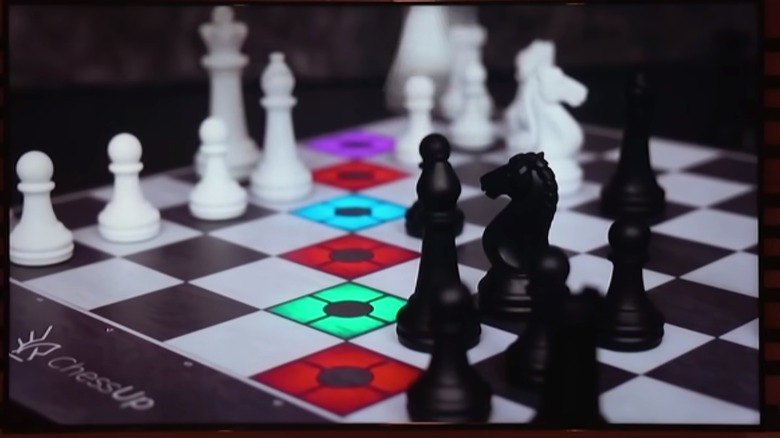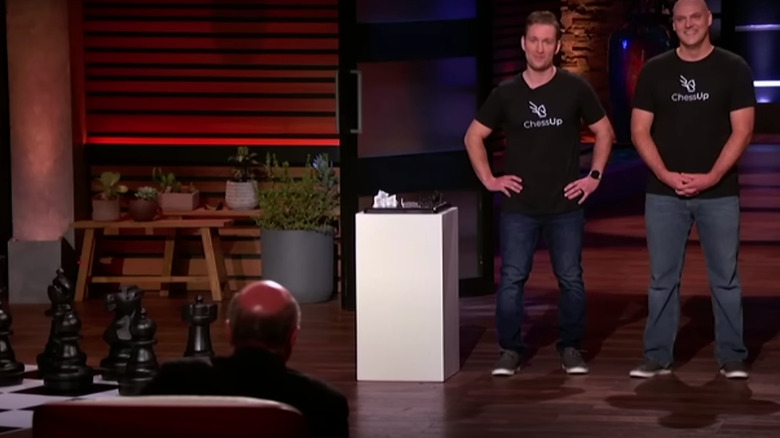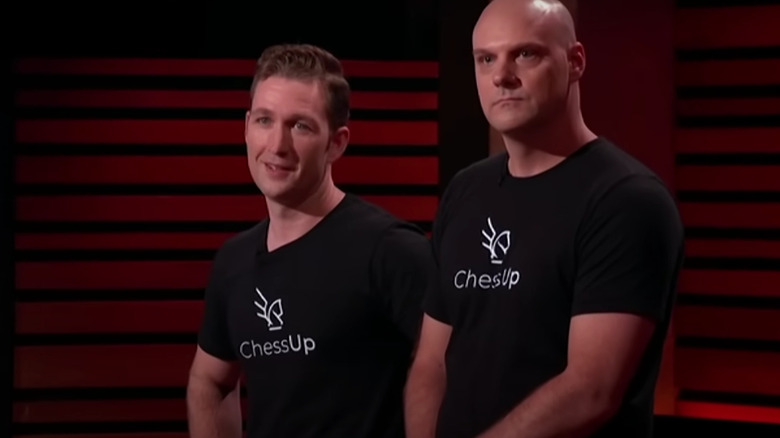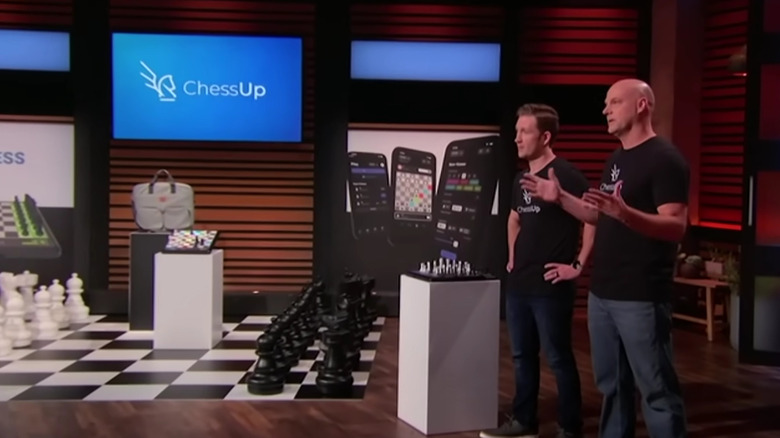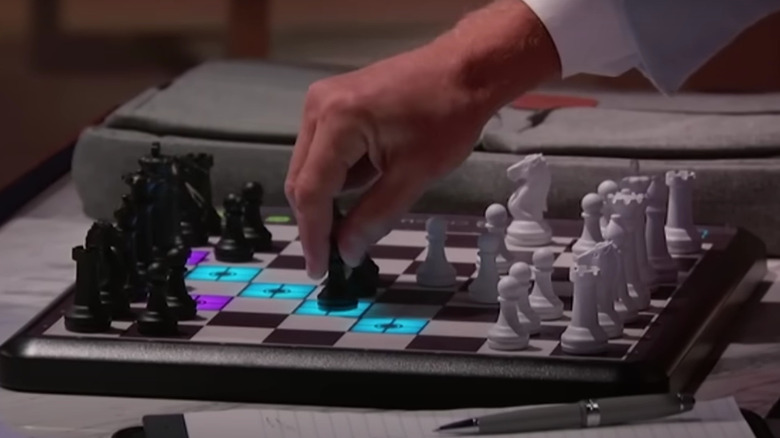What Happened To The ChessUp Smart Chessboard From Shark Tank Season 14?
We may receive a commission on purchases made from links.
Chess has been around for more than 1,500 years and has even seen some rules and name of pieces revised, with the modern rules coming about in the 15th century. This hasn't made the game any easier. Chess is challenging to learn and considerably more difficult to improve at. Two innovators and founders of Bryght Labs, Jeff Wigh and Adam Roush, stepped into the "Shark Tank" in 2022 for a little product called ChessUp. It's like a chess robot that aims to make the game a little more accessible to people. ChessUp makes things a little easier for those interested in the game by bringing an AI-assisted chessboard to market that allows players to play even if they don't have anyone else to play with.
Furthermore, the AI-powered ChessUp board aims to improve your skills as you play. The board lights up with different colors, not only showing players all the moves available to them but also how strong each move is, with green being the most optimal, blue being a secondary move, and red being the worst possible choice. That's an exceptionally valuable skill to learn for players at any level. Additionally, it comes with a companion app that players can download onto their smartphone that will help them connect with others around the world.
With 605 million adults worldwide playing chess regularly, you might be interested to know what came of this product during "Shark Tank" Season 14, Episode 9 and after Wigh and Roush left the tank.
What happened to ChessUp on Shark Tank?
Jeff Wigh and Adam Roush went onto "Shark Tank" asking for $300,000 for a 5% stake in their company Bryght Labs, giving it a $6 million valuation. The novelty of ChessUp and its AI capabilities had everybody excited to an extent. Their kickstarter numbers were especially impressive — they informed the Sharks they originally sought $30,000 on the platform and ended up raising $1.7 million. Unfortunately, some of the Sharks lost interest when they couldn't foresee consumers choosing to lug around a physical board instead of playing over the internet on their phones.
Barbara Corcoran got the ball for negotiations rolling by bowing out, believing ChessUp to be a product she couldn't work with. Mark Cuban quickly followed suit because he didn't think it was a big enough market for him. The next domino down was Kevin O'Leary, leaving Lori Greiner and Robert Herjavec in the running. Lori struggled to see the reward in investing in ChessUp and needed a little more enticement. Wigh sweetened the deal by adding a three percent royalty on every sale until she receives $450,000.
When she took a moment to think about the revised offer, Robert attempted to chime in, but Lori cut him off and accepted the deal. It might have required a small adjustment, but Wigh and Roush managed to leave "Shark Tank" with almost exactly what they were looking for.
ChessUp after Shak Tank
Going on "Shark Tank" has huge benefits, even for some entrepreneurs who are rejected by the Sharks. Ring, maker of video doorbells, for example, was famously rejected on "Shark Tank" only to be bought out by Amazon for close to $1 billion. Obviously, things go differently if a Shark takes you up on your offer. Besides landing a solid investor with deep pockets, it also boosts sales in the immediate aftermath of the episode airing, and that's exactly what happened with ChessUp. In an interview with Startland News, Bryght Labs CEO Jeff Wigh talked about the product selling out, saying, "Going on 'Shark Tank' was great for the product, good for sales, and we even get the benefit of more traffic on our website every time it re-airs."
Since the episode aired, Bryght Labs has released a few additional products to go along with the board and pieces. Since the board works in conjunction with a companion app that most players will use on their phone, players can purchase a phone stand from the ChessUp website. Along with the stand, players also receive two felt-lined bags — one for each piece color — to keep the chess pieces in.
Shortly after appearing on "Shark Tank," Bryght Labs received additional funding through a $50,000 non-dilutive grant from LaunchKC as well as an investment from Missouri Technology Corporation's IDEA Fund, which should help with the company's next goal of keeping its supply chain stocked.
Is ChessUp still in buisness?
As of this writing, ChessUp is still very much in business, offering the board and its peripherals on their website as well as on Amazon. As previously mentioned, Bryght Labs has expanded its ChessUp line of products to include chess piece bags and other accessories. Anyone who doesn't already have a phone stand or wants one with the ChessUp brand logo can order one from the website. In addition to bags for the chess pieces, ChessUp also manufactures a carrying case for the board itself. Unfortunately, it looks like the carrying case isn't available on the ChessUp website itself, instead it's only found on Amazon and a couple of other hobby websites at the moment.
Bryght Labs commonly announces on its website when a re-run of the "Shark Tank" episode airs to garner more awareness. ChessUp does have a sizeable social media presence, including X (formerly Twitter), Facebook, Instagram, YouTube, and TikTok, but it's most active on TikTok with uploads as recent as September 2024. It's less active on X where it hasn't posted since 2023.
What's next for ChessUp?
Bryght Labs is currently working on a "ChessUp Academy" that promises to deliver "a comprehensive chess lesson library with interactive content over-the-board, created by world-class chess talent." The website says it's in Beta for iOS. ChessUp is only Bryght Labs' first product on the market. The company very much intends to create STEM-focused games that will focus on assisted learning in the same way ChessUp works.
Jeff Wigh discussed the venture with Startland News, saying, "Where do we go next?" The company's next venture looks to be something in the music arena, as Jeff went on to say, "I think one of the most attractive ones is music. What can we do with smart instruments?" It won't be a simple or quick process, either. Wigh talked about him and his team wanting to create a product that can deliver "applicable improvement steps" to their customers. That will require a significant amount of data that has to be thoroughly analyzed, so it could be some time before consumers see it on the market.
